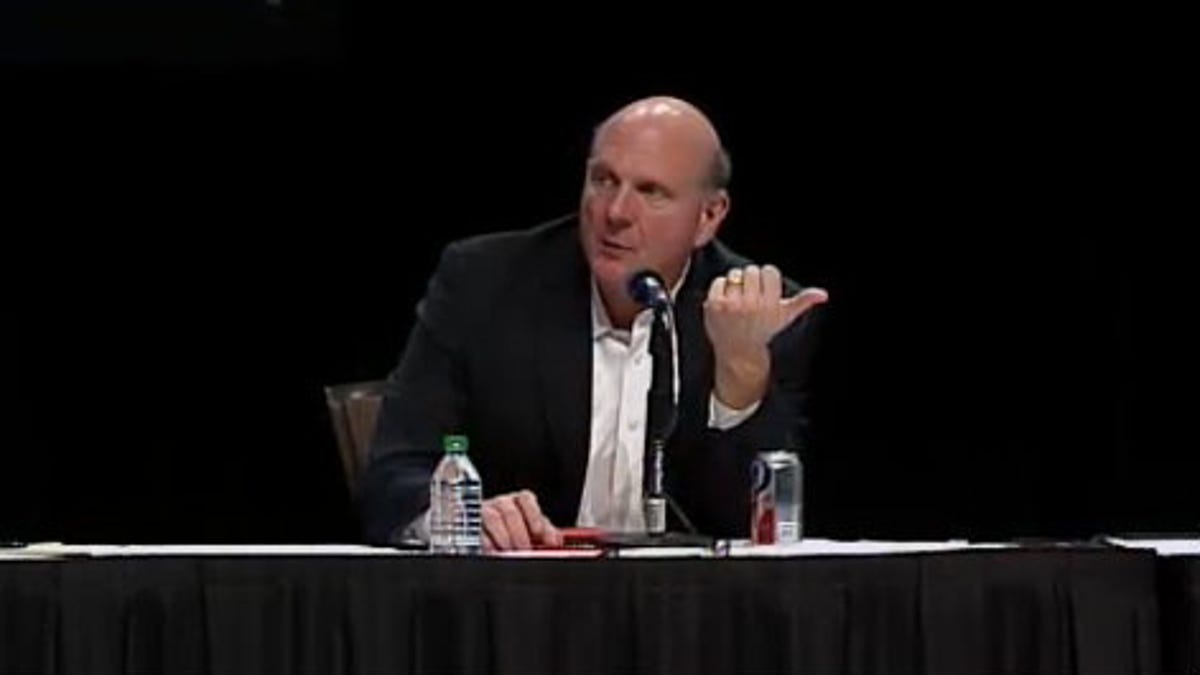Ballmer sees 'unprecedented opportunity' for Microsoft
The CEO defends Microsoft's mediocre stock performance and paints a picture of company successfully transforming itself.

But bolstered by strong early returns from Black Friday sales, Microsoft CEO Steve Ballmer nonetheless struck a confident theme today as he addressed shareholders, sketching out a picture of a company in the midst of a once-in-a-generation transformation.
"It's been a tremendously big year for us," said Ballmer, speaking at the company's annual shareholder meeting in Bellevue, Wash. He was clearly on friendly turf as most of the questions were of the softball variety, but Ballmer, who has periodically taken flak for the performance of the company's stock price, nonetheless struck an upbeat tone about Microsoft's present, noting that the company had returned $10 billion to shareholders through stock buybacks and dividends.
Given the occasion, the topic of Microsoft's stock price did indeed come up. And when one shareholder asked why the price has been flat for a decade, Ballmer had a ready answer.
"Why should I keep it?" Ballmer responded rhetorically, pointing out that over the last 10 years Microsoft has registered increased profits and revenues while management has built innovative products. "Stock markets are funny things," he said, adding that there were times that Microsoft was recognized for doing things well and other times that it did not get credit when credit was due. "Whether the market is recognizing that or not," he said, Microsoft is returning value to shareholders via dividends.
Separately, Ballmer said that Microsoft has a pipeline of strong products that would help the stock price, singling out the revenue increase coming from its search business. "We see nothing but a sea of upside," he said.
Referring to the company's busy fall, when Microsoft began shipping its new Surface tablet computer as well as a major Windows operating system update, Ballmer said the last few months had witnessed the introduction of a "remarkable wave of products." Among the new or redesigned products and services out of Microsoft, he pointed to Surface, Windows 8, Windows Phone 8, Office 2013, Bing, Internet Explorer 10, MSN, Outlook.com, SkyDrive, Skype, Xbox Music and Video, and Xbox SmartGlass.
Making reference to the 40 million Windows 8 licenses sold so far, he said that "based on customer feedback, we know for sure people get it and like it." What's more, Ballmer said that Windows Phone 8 was "off to a great start." "We're already selling 4 times more phones than at the same time last year," he said.
As happenstance would have it, Ballmer offered his upbeat comments on the same day that long-time Microsoft analyst Rick Sherlund cut his estimates for the company's growth in 2013 and said that there was confusion in the market about Windows 8.
If that report weighed on Ballmer's mind, he wasn't letting on. In fact, he said that 400 million Windows 8 PCs will get sold in the next year.
"We really are in a time of unprecedented opportunity," he said.
Flanked by his longtime partner on the dais, Microsoft co-founder and chairman Bill Gates, Ballmer talked about this being a new time for Microsoft as it makes its way from being simply being purely a software company to a company which offers great software with a complement of services and devices. "We will relentlessly focus on delightful, seamless" devices and surfaces, he said, noting as he has throughout the fall that "at times," Microsoft may decide to build own devices, as it did with the Surface.
"At times, shipping great products can feel like the end of a race," he said. "However, we're just at the beginning."

